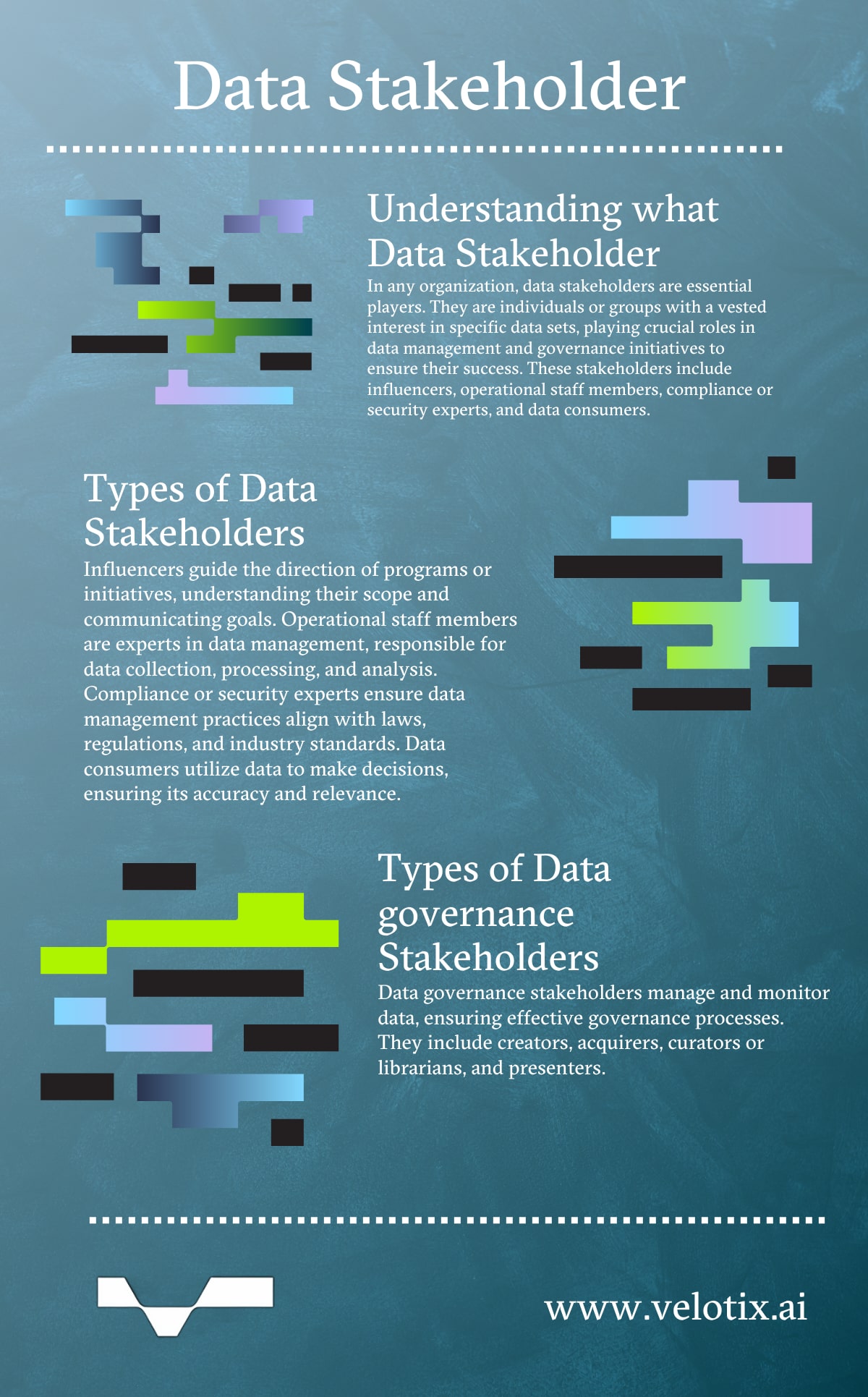What is a Data Stakeholder?
A data stakeholder is any person or group with a vested interest or investment in a particular data set. They can be inside or outside an organization, but without their support, data management and governance initiatives and practices will not succeed. Big data stakeholders have varying roles and responsibilities. Their tasks often include defining data requirements, managing data collection, analyzing data, ensuring data security, and applying data insights. A data governance initiative’s scope dictates how many stakeholders are needed. For instance, if an initiative scales across the entire organization, influencers and operational staff stakeholders are critical to its success. Most broad initiatives also require at least one compliance expert and support staff who monitor data to satisfy consumer stakeholders. Smaller initiatives might only require single-department operational staff, like a centralized reporting unit or analytics team. Stakeholders use data governance tools to support the planning, management, and execution of an organization’s data governance practices.
Who are Data Stakeholders?
There are four types of data stakeholders:
Influencers: Stakeholders who can sway a program or initiative’s direction. Their task is to understand an initiative’s scope and communicate its goals. They are skilled at comprehending and discussing why particular goals were chosen, any positive resources or obstacles that could impact the plan, and the organization’s long and short-term vision. Influencers are typically in upper-level C-suite positions, and their aim is to enhance the organization’s reputation through an initiative’s success.
Operational staff member: Stakeholders with expertise in data management in at least one data domain. They can be data owners, stewards or scientists, data quality managers or architects, report writers, or trainers for data users. They’re responsible for ensuring that data collection, processing, and analysis are performed in accordance with established guidelines and for communicating with other stakeholders regarding data-related issues. Their data-related expertise ensures ease and efficiency in implementing data policies, procedures, and standards.
Compliance or security expert: Stakeholders who safeguard data and ensure the organization’s data management practices align with relevant or applicable laws, regulations, and industry standards. Typically a data security director or manager, a compliance or security expert’s tasks include developing, implementing, and enforcing organizational policies and procedures related to data security, compliance, and privacy.
Data consumer: Stakeholders who use an organization’s data and other information to make and support decisions and analyses. Typically the greatest number of an initiative’s stakeholders, they are found at all organizational levels. Their primary role is to ensure the data they use is accurate, reliable, and appropriate to their requirements. Chief responsibilities include understanding data requirements, respecting data privacy and security, collaborating with other data stakeholders, and providing feedback to data governance teams.

Types of Data Governance Stakeholders
Data governance stakeholders manage and monitor data and measure the effectiveness of data governance processes. Primary tasks can include collaborating with other stakeholders, developing and implementing data governance policies, and identifying and mitigating data risks. There are five categories of data stakeholders:
Creators: Individuals, teams, or technologies that generate new data and ensure it is accurate, reliable, and appropriate for its intended use. Examples of creators include researchers, data scientists, and survey designers.
Acquirers: Data stakeholders who collect or acquire data and store it in a repository, such as a database. An acquirer’s primary role is to ensure data is of high quality, appropriately classified, and properly documented.
Curators or Librarians: Stakeholders who manipulate, reconcile, and correlate data in the repository or database. They also ensure data is available to the appropriate users.
Presenters: Stakeholders who retrieve data from the repository or database and distill it for presentation to other stakeholders.